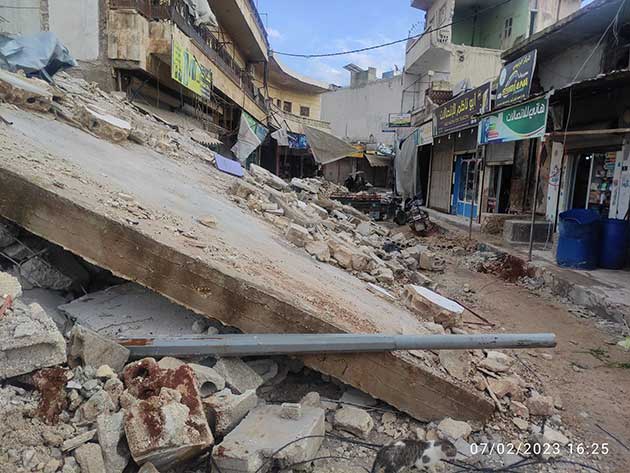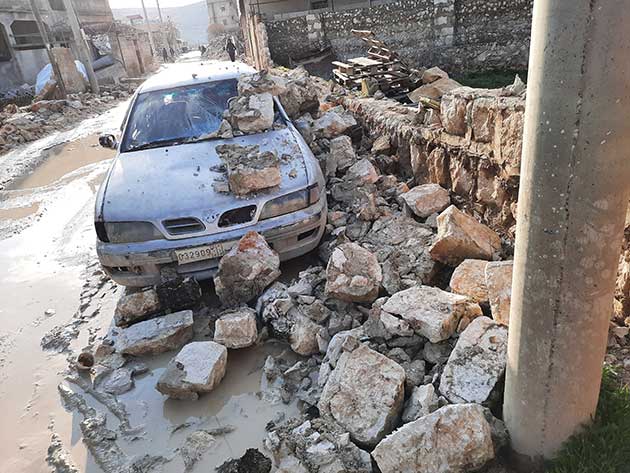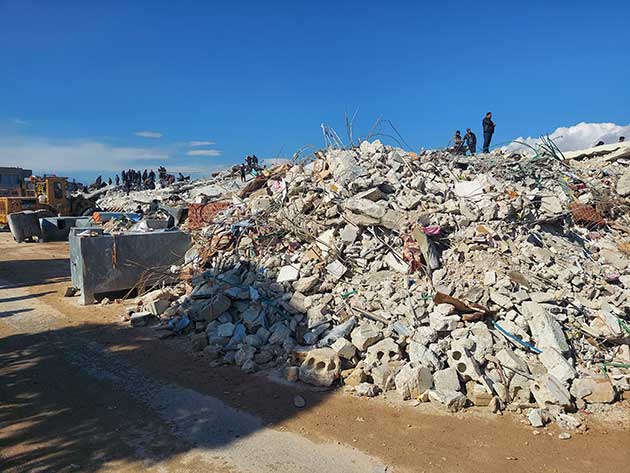Summary:
-
Almost over 33,000 people have been killed and thousands injured by the 7.8 earthquake which struck south-eastern Turkey and Syria in the early hours on Monday, February 6th.
-
Turkish President Recep Tayyip Erdogan has announced a three-month state of emergency in 10 provinces worst-affected by the earthquake.
-
Almost 3000 White Helmet volunteers have been on the ground searching for survivors and pulling the dead from collapsed buildings.
-
The destructive extent of the shock hit a number of cities in Syria, including Aleppo, Idlib, Homs, Hamah and Lattakia, including internally displaced people across Syria’s north.
-
UNHCR has warned that according to its preliminary data, as many as 5.3 million people in Syria may have been affected by the recent earthquake and will need some form of shelter assistance.
Almost over 33,000 people have been killed and thousands injured by the 7.8 earthquake which struck south-eastern Turkey and Syria in the early hours on Monday, February 6th. The first images that came out were of collapsed buildings, rubble strewn across streets, people trapped under rubbles, screaming for help. What followed was the unusually strong aftershock – including one quake which was almost as large as the first.
Rawan Kahwaji was fast asleep in her apartment in Gaziantep, in Turkey when she woke up to the sounds of people screaming. The first two minutes, she says, did not make sense to her. “It was a nightmare, I remember waking up not knowing what was going on. My apartment was shaking really hard and it went on for sometime, we didn’t expect it to be this bad, we just thought we would get out of the apartment for a few hours because earthquakes happen quite regularly. But this time with each hour that we spent waiting outside, following the aftershocks, we realised the situation was much worse,” Kahwaji said.
War in Syria had displaced Kahwaji and her family once, before they moved to Gaziantep in 2015. For many displaced like her, documents which included ID, educational degrees and travel documents meant more than anything for survival. “In the middle of that chaos, we realised we needed our documents in case we had to leave the city. Our apartment was full of cracks and everything inside was destroyed, we somehow managed to get our documents.

After spending two days in a shelter in Gaziantep, Kahwaji and her family were amongst the few who managed to get to Ankara safely, but she describes the experience as something she has never seen before. “There were people on the road screaming, we could hear people crying for help, I saw people collapsing because they were having heart attacks. I don’t know if they made it through or not, but it was complete chaos. We lost a lot, we lost our business, our lives, physically we are safe, but mentally we are not fine. I am still imagining the earth shaking and we are all simply sitting, waiting in anticipation that something is going to happen to us again,” Kahwaji said.
It has been almost a week of relentless search and rescue operations, as workers across these regions are still trying to pull survivors from the rubble – there have been some harrowing stories of success and also of heartbreak. Turkish President Recep Tayyip Erdogan has announced a three-month state of emergency in 10 provinces worst-affected by the earthquake.

Syria Civil Defence – also known as White Helmets have been in news since the beginning of the earthquake for their immediate call to action to rescue those trapped under rubbles and for saving lives.
Almost 3000 White Helmet volunteers have been on the ground searching for survivors and pulling the dead from collapsed buildings. It’s been a race against the clock, those who have made it through for them the challenge has been to survive the cold weather, toxic smoke as people burnt plastic to stay warm, lack of water and basic necessities.

Cities closest to the epicentre of the earthquake, as per this report, when the temperatures rose on Sunday and it became warm, “odour of rotting bodies became discernible. It was the smell of death.”
“The situation has been very catastrophic, both personally and also collectively,” says Muzna Dureid, Senior Program Manager, White Helmets in an interview given to IPS said, “One of the worst impacted regions is North West Syria, home to almost 4.5 million people who have been forcefully displaced multiple times, they have witnessed the siege, the chemical attacks, bombardments, all types of suffering and now this earthquake.

“Unfortunately the situation has been beyond the capacity of our team, we are working with very limited resources as cities and villages have been completely destroyed. Families have been destroyed, so many are living on the streets in dire weather conditions,” Dureid said.
The possibility of finding survivors continues to decrease as the hours pass. A UN liaison officer warned that the two countries are nearing the end of the search and rescue window. The World Health Organization (WHO) estimates up to 23 million people could be affected by the earthquake across both the countries.

The Norwegian Refugee Council (NRC) has been working on the ground across Syria providing relief, water, and support to those affected by the earthquake. In a statement issued here, NRC says, “The quake happened at the worst time of the night at the worst time of the year. The destructive extent of the shock hit a number of cities in Syria, including Aleppo, Idlib, Homs, Hamah and Lattakia, including internally displaced people across Syria’s north.”
“We are now entering a new phase with search and rescue operations largely coming to an end. The real scale of the disaster will start to crystallise in the coming days,” says Emilie Luciani, Country Director, Syria Response Office, Norwegian Refugee council in an interview to IPS.

“Thousands of families are without shelter in open areas or seeking refuge in damaged buildings, existing internally displaced people’s (IDP) sites, reception centres, collective centres or beings temporarily hosted by other families. Communication has been very difficult, and roads around the main affected areas are damaged.
“People in North West Syria are in a desperate situation. They have already spent many years displaced and reliant on humanitarian assistance, and now unfortunately, the aid reaching them is also restricted as the United Nations can only utilise one crossing-point to reach them from Turkey which only just reopened – 5 days after the earthquake,” says Luciani.
According to this report, the Syrian government in Damascus has been receiving aid from international donors, but there is a lot of uncertainty about whether that will be equitably distributed to all the affected parts of Syria including the rebel held North West.

The Red Cross has called for urgent access in Northern Syria to help people who need urgent support. “Impartial humanitarian assistance should never be hindered, nor politicised,” it says.
Avril Benoit, Executive Director, Doctors Without Borders (MSF) USA said: “The massive consequences of this disaster will require an equally massive international response. People urgently need shelter, food, blankets, clothes, heating materials, hygiene kits, and medical assistance – including access to mental health support. For Syrians living the earthquake zone, this is catastrophe layered on top of crisis after crisis. People have endured more than a decade of war, an economic crisis, the COVID-19 pandemic and a recent cholera outbreak, benoit said.
UNHCR has warned that according to its preliminary data, as many as 5.3 million people in Syria may have been affected by the recent earthquake and will need some form of shelter assistance. A huge number and this destruction comes to a population already suffering mass displacement.
“We are really worried, as we have seen in the past, the world has the habit of replacing a crisis with a new crisis and so on. Right now everyone is opening their doors, giving donations, opening relief camps and emergency response which is needed, no doubt but what after that? We are worried that after a week or so when everyone goes back to their routine life, we will forget about those impacted by the earthquake, especially women and children, says Anila Noor, Managing Director of Women Connectors and a policy expert on refugees and migration.
“These are poor people, who have suffered due to war, they live with very limited resources especially in Syria. Emergency response is the first step, but we need to see how we can help them later, make an ecosystem and a system of accountability to track where the money and aid goes, and also see the local efforts,” says Noor.

